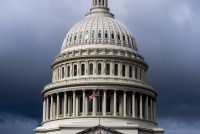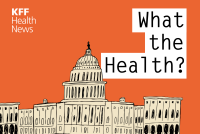Latest Morning Briefing Stories
What Happens to Health Programs if the Federal Government Shuts Down?
Medicare and Medicaid shouldn’t be affected, but confusion can be expected.
New Medicare Advantage Plans Tailor Offerings to Asian Americans, Latinos, and LGBTQ+
As more seniors opt for Medicare Advantage, a few small insurers have begun offering plans that provide culturally targeted benefits for cohorts including Asian Americans, Latinos, and LGBTQ+ people. The approach, policy researchers say, has potential and perils.
Nuevos planes de Medicare Advantage adaptan ofertas para asiáticos, latinos y LGTBQ+
A medida que Medicare Advantage gana popularidad entre los adultos mayores, tres compañías del sur de California están lanzando nuevos planes que se enfocan en comunidades culturales y étnicas, con ofertas especiales y profesionales que hablan su idioma nativo.
KFF Health News' 'What the Health?': Underinsured Is the New Uninsured
The annual U.S. Census Bureau report this week revealed a drop in the uninsured rate last year as more working-age people obtained employer coverage. However, this year’s end of pandemic-era protections — which allowed many people to stay on Medicaid — is likely to have changed that picture quite a bit since. Meanwhile, reports show […]
As More Patients Email Doctors, Health Systems Start Charging Fees
Doctors say billing for email consultations reduces message volume and gives them more free time. The increasingly prevalent practice has also raised fears about negative impacts to patient care.
Pacientes reciben facturas por enviarles correos electrónicos a sus médicos
Con un fuerte aumento de los mensajes de correo electrónico durante la pandemia de covid, un número creciente de sistemas de salud han empezado a cobrar a los pacientes cuando los médicos y otros profesionales clínicos responden a sus mensajes.
Pfizer, Moderna Push the New Covid Booster. Should You Get It? The CDC Is About to Decide.
Chances are, if you aren’t older, chronically ill, or obese, you don’t need a forthcoming covid vaccine to stay out of the hospital. But it probably wouldn’t hurt.
A pesar de las amplias recomendaciones para el refuerzo anticovid actualizado publicadas el otoño pasado, sólo el 17% de la población la recibió, y alrededor del 43% de las personas de 65 años o más.
Hollywood’s A-List Health Insurance Is Jeopardized by the Labor Strikes
Hollywood actors and writers who qualify for their union health plans get a very good deal compared with other Americans. But not working during the strike threatens their eligibility in the system.
KFF Health News' 'What the Health?': 3 Health Policy Experts You Should Know
In this special episode of KFF Health News’ “What the Health?” host Julie Rovner interviews three health policy experts.











